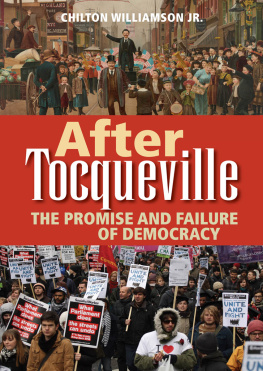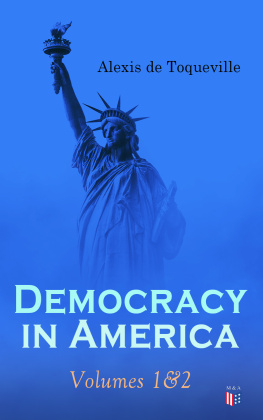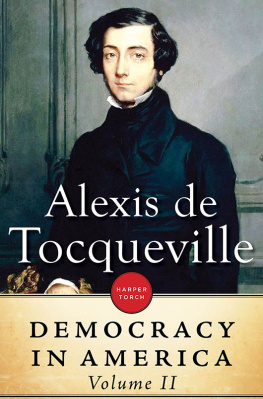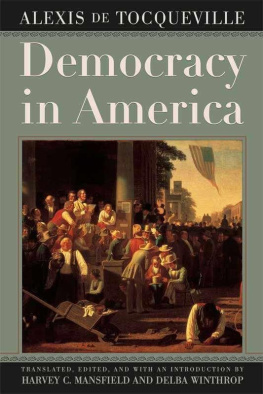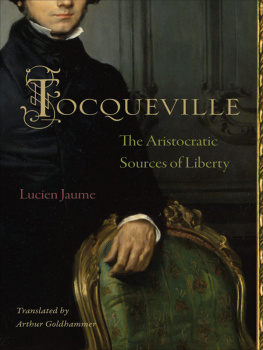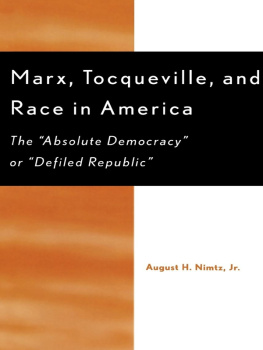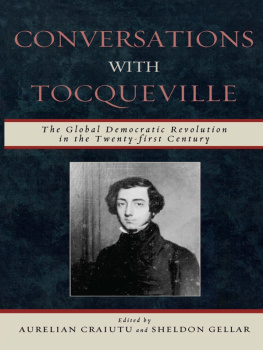Also by Chilton Williamson Jr.
Nonfiction
The Immigration Mystique: America's False Conscience
The Conservative Bookshelf
Narrative Nonfiction
Saltbound: A Block Island Winter
Roughnecking It: Or, Life in the Overthrust
The Hundredth Meridian:
Seasons and Travels in the Old New West
Fiction
Desert Light
The Homestead
Mexico Way
The Education of Hctor Villa
Editor
Immigration and the American Future
See, I put before you today a benediction and a curse.
Deuteronomy 11:26
On what bridge does the present pass to the future?
Friedrich Nietzsche, Thus Spoke Zarathustra
All systems, however erroneous or false, have an element of truth, because the human intellect, being created in the image of the divine, and made for the apprehension of the truth, can never operate with pure falsehood.
Orestes S. Brownson, The American Republic
Democracy is the word with which you must lead them by the nose.
C. S. Lewis, The Screwtape Letters
Preface
Two Books
About a decade and a half ago, a young scholar from Oxford, England, set out in the company of a lady companion named Margaret on a journey of fourteen thousand miles across France. The author of acclaimed biographies of Hugo, Balzac, and Rimbaud, Graham Robb owed his early, superficial understanding of the French language to an Algerian Berber in whose auto shop in a Paris faubourg he worked for a time. The couple's mode of travel was by time machine. Theirs was not the futuristic invention of H. G. Wells but a contraption already a century old: the humble perennial bicycle, powered by human muscle and breath, regulated by nothing more complex than gear ratios, critically dependent on a strong inner tube, and capable of speeds no greater than the stagecoaches familiar to readers of The Red and the Black and The Charterhouse of Parma.
Graham Robb had a wide familiarity with the history of monarchical and Republican France, of the great personages who animate the histories of that noble country that so many knowledgeable and sophisticated people have so long considered to have been the most civilized in Europe, and of its transformation during the course of the nineteenth century by revolution, war, political reform, industrialization, social reform, and centralization. Robb himself was in search of another France: the old, prerevolutionary country that had managed to survive a century and a quarter of nationalism and centralization, from 1789 until cataclysm befell Europe in 1914.
Of that country, Robb had little more than an informed apprehension. On the day the Bastille fell to the Paris mob, French was a language as incomprehensible as English or German to the nine-tenths of the inhabitants of France living outside the capital city. It was a country that had still not been accurately mapped in its entirety when Balzac wrote, Robb notes. A little further back in time, sober accounts described a land of ancient tribal divisions, prehistoric communication networks and pre-Christian beliefs. Historians and anthropologists had referred to this country, without irony, as Gaul and quoted Julius Caesar as a useful source of information on the inhabitants of the uncharted interior.
In prerevolutionary times, France meant the province of which Paris was the heart. As far as French anthropology is concerned, prehistory did not end until the Revolution. Before then, the State took no interest in the cultural and ethnic diversity of the masses. To put the matter differently: the national government in Paris left them alone. The French provincial's fatherland, his Marianne, was his pays; while the pays within the territory historically known as France were so numerous that, as late as 1937, some of them remained unknown. The pays (from the Latin pagus) was understood by Julius Caesar to be a region that a tribal entity recognized as home, often no broader than the clang of a village church bell could carry. Some of these towns and villages were flourishing democracies when France was still an absolute monarchy, Robb observes. These communities were proud of their provinciality. Far from wishing to expand their sense of identity, they were rather concerned with straitening and deepening it. So well managed were the pays and the towns that formed their nuclei that crime appears to have been nearly nonexistent in prerevolutionary France. Away from the capital, almost everyone spoke a separate and distinct patois.
In the opinion of two late-twentieth-century scholars, Herv Le Bras and Emmanuel Todd, from the anthropological point of view, France ought not to exist. Robb asserts that, owing to the complex genetic inheritance of the Celtic and German tribes who invaded the Roman province, the same could be said from the point of view of ethnicity: Before the mid-nineteenth centuryFrance was effectively a land of foreigners. If the government of these various tribes was democratic in a rudimentary, patriarchal sense, in religion they embraced local superstition, paganism inherited from their Celtic forebears and from the Romans, and Christianity (Roman Catholicism) with substantial grafts of paganism and superstition, often tolerated by the local priest and even by his superiors, who recognized the utility of incorporating local legend with the universal Faith. Young people married their blood relations, and most people lived their entire lives in the pays, venturing perhaps no more than a few miles from their front doors. Foreigners were disliked and distrusted, to the point of being set on occasionally by the natives. There was a lively belief in witchcraft, conducive to witch burning. As travel was at best infrequent, trade between the various pays was uncommon, and each was therefore self-supporting, living off its modicum of land and natural resources.
Of all this, the civilized Parisian minority knew nothing, or next to nothing. Its members had little or no cause to venture into the provinces, and the roads in any case were atrocious or nonexistent. The large majority of France stretched away, as yet unmapped, between its boundaries of ocean, mountain, and plain; the many blank spaces within the territorial outline might have been inscribed Here Be Hippogriffes. To the hippogriffes themselvespeople who lived their whole lives in a small town or villageFrench imperial justice [when it finally reached them] could be just as shocking and incongruous as it was to the people of colonial North Africa.
The new French Republic, in its eagerness to demonstrate national unity, fixed the new administrative boundaries with a cavalier disregard for existing tribal divisions. It was equally careless of the hundreds of tiny discrete civilizations in which the France of the time abounded; hence, Robb says, modern France is not just the result of continuous traditions; it was also formed from disappearances and extinctions. In Year II (1794) of the Republic, Abb Henri Grgoire published a report titled The Necessity and Means of Exterminating Patois and Universalizing the Use of the French Language. Based on questions sent out to, and mailed back from, town halls across the country, Grgoire's report showed France to be a linguistic muddle of numerous patois and two Romantic languagesFrench in the north and Occitan in the southwhich, on closer inspection, could be understood as having been fractured into numerous incomprehensible dialects. The situation was as Grgoire had feared, only much worse. Six million of the fifteen million French people, it seemed, were wholly ignorant of the language of polite Europe. Another six million could scarcely be said to speak French. Of the three million able to converse in it, a great many were incompetent to write the language. How could France plausibly call itself a nation in the absence of a national, a common language? Lacking such, the French people were, in the abb's estimation, too ignorant to be patriotic. Some of these citizens even believed that King Louis XVI still sat on his throne at Versailles.

